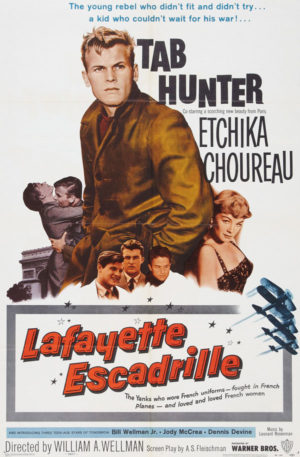
Catalina Drive epitomized the post-war American dream. Low-slung ranches on quiet streets, with large yards, green grass and thirsty palm trees — this was the stuff that transformed the desert between Phoenix and Scottsdale into a suburban paradise.
Who knows what actually went on behind those closed doors on Catalina Drive. A lot, probably. Divorce rates were edging up. Beer bottles in the trash cans and raised voices heard from back yards hinted at other troubles in paradise. So did the rumors about affairs, the bread man or the milk man who lingered at that house a little too long.
That house. Every neighborhood seemed to have one. For Catalina Drive, it was 4042. That house, on the outside, looked more or less like every other house on Catalina Drive. But inside, well, let me tell you…
The woman who lives there is really young. Only 21 and already she’s divorced and with two young boys. She inherited more than $20,000, enough to buy it just a little while ago. She’s already in trouble for bringing marijuana in from Mexico at Nogales. Now she’s got parties going on there every single weekend. Wild parties, with thirty, forty people maybe. And here’s the thing: almost all of them are men. Weird men, some of them with makeup and curly eyelashes. The kind you don’t want anywhere near your children.
So the neighbors on Catalina Drive did something about it. They called the police. And just to be sure, they also called the mayor. Mayor Jack Williams asked Police Lt. Charles Hodges to keep a good watch on this “influx of homosexuals.” Vice-squadders kept an eye on that house for the next two week. Four more parties took place during those two weeks in that house.
Finally, it’s Saturday night, February 8, and another party is underway. It’s time to act. Police raided the place and found 31 people there: 27men and only four women. According to the Arizona Republic, “there were Negroes, Spanish-Americans, and whites at the party, which was raided at 5 a.m.”
But as Lt. Hodges admitted later, there is no law against homosexuality itself. And they didn’t find that anyone at the party that had committed any “overt act which are illegal (sic).” So all he could do was arrest eleven of them on misdemeanor charges, for being drunk or for drinking under the age of 21. Police also found marijuana in the home. That was the homeowner’s. Her problems just kept piling up.
“Something should be done about such orgies,” said Lt. Hodges, of this particular non-orgy. “Laws should be enacted to deal with such homosexuals.” One neighbor said he was going to organizing a vigilante group to “deal with these persons in our own way.” These “twisted personalities,” he said, were a threat to children.
The raid was a hot topic at the City Council meeting on February 24. The council members wanted to “declare war on Phoenix sexual deviates,” reported the Republic. Eight Catalina Drive residents were there. One of them said that police might have to arrest him for “shooting somebody up” if one of those people came near his children. He asked council to find “ways and means to deal with all people like those.”
But city attorney William C. Eliot said you can’t just arrest people suspected of being homosexual because it’s like arresting someone with tendencies to commit burglaries. You can only arrest people if they actually commit a crime. Mayor Williams grumbled that the law doesn’t even allow for running suspects out of town.
Epilogue:
Mayor Williams, a former radio announcer, later served as Arizona Governor from 1967 to 1975. He had entered politics as a member of the city school board, where he helped to integrate the city’s schools. He joined the City Council in 1954 when fellow councilman Barry Goldwater nominated him to fill an empty seat.
On the Timeline:
![]() February 8, 1958: Phoenix police arrest 11 in a raid on a private party.
February 8, 1958: Phoenix police arrest 11 in a raid on a private party.
Periscope:
For February 8, 1958:
| President: | Dwight D. Eisenhower (R) | |||
| Vice-President: | Richard M. Nixon (R) | |||
| House: | 233 (D) | 196 (R) | 0 (Other) | 6 (Vacant) |
| Southern states: | 99 (D) | 7 (R) | ||
| Senate: | 49 (D) | 47 (R) | ||
| Southern states: | 22 (D) | |||
| Inflation: | 3.3% | |||
| Unemployment: | 6.4% | |||
 Headlines: The Defense Department says sending a satellite to the moon may be possible this year. A severe winter storm on the East Coast brings heavy snow, high winds and freeze warnings as far south as central Florida. An Air Force Atlas rocket blows up in a test firing. Police in five stages search for the kidnappers of a Flagstaff man who was forced at knifepoint to drive to Gallup, where he was tied up and left at the side of the road. Two days earlier, a Holbrook man was kidnapped and released in Benson; his kidnappers were captured in El Paso, Texas.
Headlines: The Defense Department says sending a satellite to the moon may be possible this year. A severe winter storm on the East Coast brings heavy snow, high winds and freeze warnings as far south as central Florida. An Air Force Atlas rocket blows up in a test firing. Police in five stages search for the kidnappers of a Flagstaff man who was forced at knifepoint to drive to Gallup, where he was tied up and left at the side of the road. Two days earlier, a Holbrook man was kidnapped and released in Benson; his kidnappers were captured in El Paso, Texas.
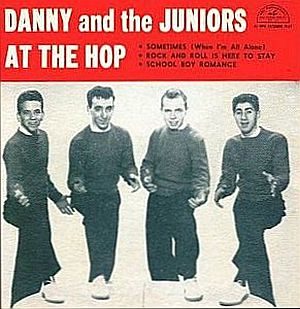 On the radio: “At the Hop” by Danny and the Juniors, “Get a Job” by the Silhouettes, “Short Cuts” by the Royal Teens, “Don’t” by Elvis Presley, “Sail Along Silvery Moon” by Billy Vaughn and his Orchestra, “The Stroll” by the Diamonds, “Sugartime” by the McGuire Sisters, “I Beg of You” by Elvis Presley, “Great Balls if Fire” by Jerry Lee Lewis, “Peggy Sue” by Buddy Holly.
On the radio: “At the Hop” by Danny and the Juniors, “Get a Job” by the Silhouettes, “Short Cuts” by the Royal Teens, “Don’t” by Elvis Presley, “Sail Along Silvery Moon” by Billy Vaughn and his Orchestra, “The Stroll” by the Diamonds, “Sugartime” by the McGuire Sisters, “I Beg of You” by Elvis Presley, “Great Balls if Fire” by Jerry Lee Lewis, “Peggy Sue” by Buddy Holly.
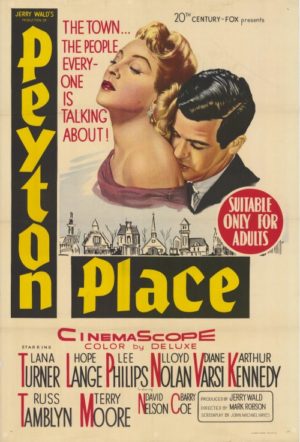
On television: Gunsmoke (CBS), The Danny Thomas Show (CBS), Tales of Wells Fargo (NBC), Have Gun, Will Travel (CBS), I’ve Got a Secret (CBS), The Life and Legend of Wyatt Earp (ABC), General Electric Theater (CBS), The Restless Gun (NBC), December Bride (CBS), You Bet Your Life (NBC), Alfred Hitchcock Presents (CBS).
New York Times best sellers: Fiction: By Love Possessed by James Gould Cozzens, Rally Round the Flag, Boys! by Max Shulman, Anatomy of a Murder by Robert Traver. Non-fiction: Please Don’t eat the Daisies by Jean Kerr, Baruch: My Own Story by Bernard Baruch, Kids Say the Darndest Things! by Art Linkletter.
Sources:
“Neighbors aroused: 11 nabbed in raid by anti-vice squad.” Arizona Republic (Phoenix, February 9, 1958): section 2, page 2.
“City Council seeks potent weapons in war on Phoenix sexual deviates.” Arizona Republic (February 25, 1958): 7/
![[Emphasis Mine]](http://jimburroway.com/wp-content/uploads/2018/01/RainbowWhiteHouse.jpg)
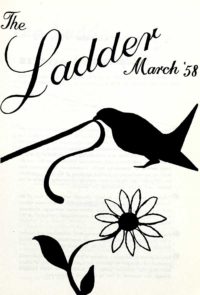 I wish it were possible for me to wr1te this on my letterhead, but my “world” would be too shocked if they were to learn their perfectly proper and “normal” appearing friend, business and professional member of their society were any different than she appears. And more shocked to know that she is secretly glad to be a Lesbian.
I wish it were possible for me to wr1te this on my letterhead, but my “world” would be too shocked if they were to learn their perfectly proper and “normal” appearing friend, business and professional member of their society were any different than she appears. And more shocked to know that she is secretly glad to be a Lesbian.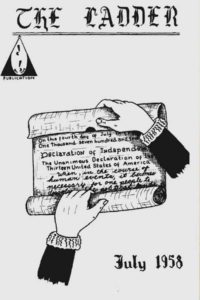 I was touched by your article, “Yes, I Am” in the March edition of THE LADDER; touched, and a little terrified.
I was touched by your article, “Yes, I Am” in the March edition of THE LADDER; touched, and a little terrified.
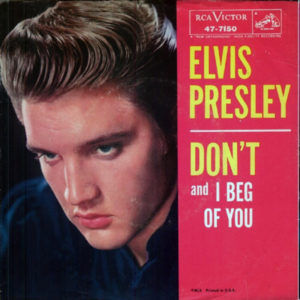 On the radio: “Don’t” by Elvis Presley, “Get a Job” by the Silhouettes, “Sweet Little Sixteen” by Chuck Berry, “Short Shorts” by the Royal Teens, “Oh Julie” by the Crescendos, “26 miles (Santa Catalina)” by the Four Preps, “Who’s Sorry Now” by Connie Francis, “The Walk” by Jimmie McCracklin and His Band, “Tequila” by the Champs, “The Stroll” by the Diamonds, “At the Hop” by Danny and the Juniors, ,”Lollipop” by the Chordettes, “Breathless” by Jerry Lee Lewis.
On the radio: “Don’t” by Elvis Presley, “Get a Job” by the Silhouettes, “Sweet Little Sixteen” by Chuck Berry, “Short Shorts” by the Royal Teens, “Oh Julie” by the Crescendos, “26 miles (Santa Catalina)” by the Four Preps, “Who’s Sorry Now” by Connie Francis, “The Walk” by Jimmie McCracklin and His Band, “Tequila” by the Champs, “The Stroll” by the Diamonds, “At the Hop” by Danny and the Juniors, ,”Lollipop” by the Chordettes, “Breathless” by Jerry Lee Lewis.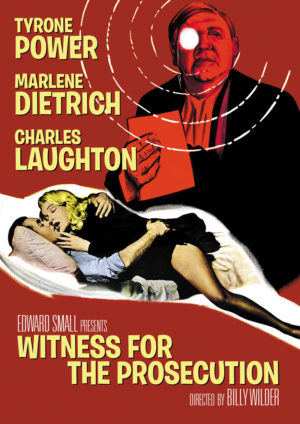
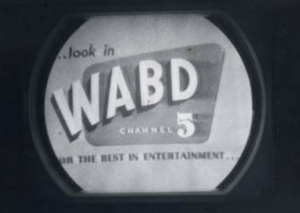 In 1958, WABD, the former flagship station of the defunct DuMont network, decided to host a discussion of homosexuality on its half-hour afternoon public affairs program, Showcase. Its producer decided it might be interesting to have a real live homosexual on live television. He contacted Tony Segura, the New York chapter president of the Mattachine Society. Segura agreed to appear, on the condition that his name wasn’t mentioned and he could wear motorcycle goggles while on the air to hide his face. Those precautions were important: homosexuality was a felony in New York, punishable with up to twenty years in prison.
In 1958, WABD, the former flagship station of the defunct DuMont network, decided to host a discussion of homosexuality on its half-hour afternoon public affairs program, Showcase. Its producer decided it might be interesting to have a real live homosexual on live television. He contacted Tony Segura, the New York chapter president of the Mattachine Society. Segura agreed to appear, on the condition that his name wasn’t mentioned and he could wear motorcycle goggles while on the air to hide his face. Those precautions were important: homosexuality was a felony in New York, punishable with up to twenty years in prison. Headlines: Rep. John J. Dempsey (D-NM) dies at the age of 78 from a viral infection; he had been hospitalized for two weeks. The unemployment rate reachers 6.7%, surpassing the peak unemployment rate of the 1953-1954 recession. Congressional representatives from both parties call for increasing unemployment insurance and accelerating public works spending to combat rising unemployment in the eight-month-old recession. Vice President Nixon says he favors a tax cut over increased spending if more anti-receission measures are needed. A B-47 bomber accidentally drops an unarmed atomic bomb onto a farm near Florence, South Carolina. Cuban dictator Fulgencio Batista promises to hold fair elections on June 1 amid continuing violence with Fidel Castro’s armed rebels.
Headlines: Rep. John J. Dempsey (D-NM) dies at the age of 78 from a viral infection; he had been hospitalized for two weeks. The unemployment rate reachers 6.7%, surpassing the peak unemployment rate of the 1953-1954 recession. Congressional representatives from both parties call for increasing unemployment insurance and accelerating public works spending to combat rising unemployment in the eight-month-old recession. Vice President Nixon says he favors a tax cut over increased spending if more anti-receission measures are needed. A B-47 bomber accidentally drops an unarmed atomic bomb onto a farm near Florence, South Carolina. Cuban dictator Fulgencio Batista promises to hold fair elections on June 1 amid continuing violence with Fidel Castro’s armed rebels.
